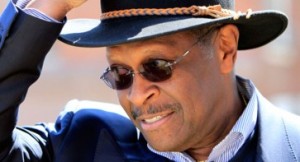(ThyBlackMan.com) Herman Cain came out of nowhere last week to be the most talked-about contender in the first 2012 Republican presidential debate. Though to many professional observers he simply held his own as the only candidate with no government experience, to the focus group of South Carolina Republicans who had watched the debate, Cain won hands down. “Most direct,” “fresh air,” “clear and concise,” “common sense,” “talks straight” and “honest” were the terms used by members of the group when talking about Cain.
Indeed, he doesn’t sound like a politician, i.e., he doesn’t talk about legislation or amendments or statutes. Rather, he uses words the average Joe and Jane might use in discussing policy issues. “I don’t talk over  people’s heads, and I don’t use the usual political lingo,” Cain told the Wall Street Journal. This makes him easily understood.
people’s heads, and I don’t use the usual political lingo,” Cain told the Wall Street Journal. This makes him easily understood.
But other candidates certainly performed well. Ron Paul, per usual, was lively and informed, and won the Fox News website poll (Paul’s supporters usually participate heavily in these; Cain came in second). Gary Johnson impressed the audience when he told them that he had climbed Mt. Everest. Tim Pawlenty and Rick Santorum showed themselves to be well-informed and adept at answering tough questions on economic and social issues.
So what made Cain stand out?
Part of it was his straight talk. But he also has a not-so-secret weapon: He’s black. And conservative Republicans, with their reputation for being racist, or at least oblivious to black concerns, love to find an African American who speaks their language. It absolves them of the racist charge: If they are supporting a black candidate, how can they be racist?
Herman Cain is not the first black conservative to benefit from this phenomenon. In 1999, the oratorically gifted and hard-right conservative Alan Keyes won the Republican straw poll in – would you have guessed it? – Alabama. When J. C. Watts (R-OK), a former pro-football player, was in the House, he became the most requested speaker on the South’s GOP rubber chicken circuit. And Supreme Court Justice Clarence Thomas, though not an elected official, became a cause celebre of conservatives during his controversial confirmation hearings.
In the last election, three conservative Republican black candidates won high office in Dixie. Allen West (R-FL), a veteran of the war in Iraq, demonstrated effective use of Tea Party-style rhetoric and won a hard-fought victory in South Florida. Tim Scott, a ten-year veteran of the Charleston County Council, had the support of the Club for Growth, Sarah Palin and Mike Huckabee and defeated the sons of Republican legends Strom Thurmond and Carroll Campbell in a Republican congressional runoff. And state Rep. Jennifer Carroll (R-FL), who gets points for having a son playing for the Miami Dolphins, was picked by Republican gubernatorial nominee Rick Scott as his running mate; she is now lieutenant governor of Florida.
The striking thing about all of the black Republican elected officials is that they get elected almost entirely with white support. Watts finally began to win a respectable share of the black vote – up to 30 percent – during his latter time in Congress, but by and large, black voters have avoided black Republican candidates the way white Southern Democrats used to avoid GOPers in the pre-Civil Rights era.
The other striking thing, of course, is the enthusiasm black Republicans evoke among white voters who have shown little or no understanding or willingness to support policies that are designed to help African Americans. Affirmative action, though kept carefully off the front burner by most of Dixie’s GOP establishment, has no white Republican support (though Watts viewed it in a positive light). In the last several state legislative sessions, more than one Southern state has acted favorably on proposals to require voters to present a photo ID when voting. The measure is designed to prevent fraud, but most civil rights leaders regard it as a thinly veiled attempt to curtail black voter participation. And proposals to make it easier for ex-convicts to vote have generally fallen on deaf ears among Southern GOP lawmakers.
So there is good news and bad news. The good news is that, for whatever reason or combination of reasons, Southern Republicans are looking favorably on African-American candidates, which – as the South moves further into the GOP column – could prove helpful to the black community. Moreover, if this trend continues, it may help the GOP integrate – and enlarge – its base in the post-Obama future, which could be crucial to the party as the mostly-Democratic Hispanic vote continues to grow.
The bad news is that the black conservatives may end up as mere window-dressing, like the companies who used to hire a black receptionist but kept the rest of the work-force near-lily white. (Some critics put former Republican National Chairman Michael Steele in this category.) If this proves to be the case, the Cains, the Scotts, the Wests, and the Carrolls, not to mention the Republican Party, will have missed a major opportunity to transform Southern politics.
Written By Hastings Wyman
Official website; http://www.southernpoliticalreport.com
















The thing is Hastings Wyman, is that actually there is only ONE political party in America. The Capitalist Party, disguised as multiple parties so that the American people can feel if though they have options. America does just like South Africa did, in reference to the end of Apartheid. America will make certain concessions for certain people ONLY when absolutely necessary. America has learned how to avoid REVOLUTION at home, while guaranteeing REVOLUTION abroad. “A Black Man Who Cares”